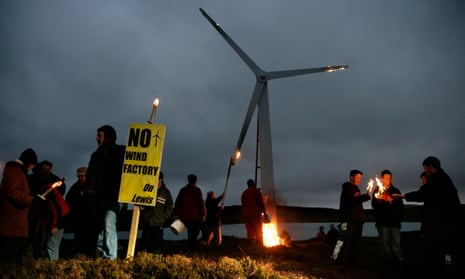Investment in the UK’s low-carbon economy has fallen dramatically, endangering jobs and putting in doubt the government’s commitments on climate change, an influential committee of MPs has warned.
Funds going into renewable energy, the mainstay of the low-carbon economy, fell more than 50% in 2017, having dropped by 10% in 2016, bringing annual investment in the sector to its lowest since the financial crisis in 2008.
The environmental audit committee (EAC) said on Wednesday that the government would be unable to meet its pledges on carbon emission reductions, if the collapse continued.
The MPs also said the government was failing to implement policies to cut emissions from transport, heating and industry, and called on ministers to consider raising a “sovereign green bond”, as other countries have done, in order to stimulate investment.
The criticisms come even as the government has boasted of a clean growth strategy, and a 25-year environmental plan that will address climate change along with other green priorities such as pollution and biodiversity.
Mary Creagh, chair of the EAC, said: “The clean growth strategy was long on aspiration, short on detail. The government must urgently plug this policy gap and publish its plan to secure the [billions of pounds of] investment required to meet the UK’s climate change targets, and explore how a sovereign green bond could kickstart its strategy.”
Cuts to taxpayer-funded support for renewable projects, along with planning obstacles that have effectively ruled out new onshore wind turbines across much of the country, have deterred energy companies and their financial backers. The market for energy efficiency measures, such as home insulation, has also seen a sharp decline since the government scrapped its flagship policy, and the Green Investment Bank was sold off.
Alex White, senior policy officer at the Aldersgate Group, said: “There are willing investors in the green economy, but not enough projects to invest in. Boosting the pipeline of green infrastructure projects will be critical to meet the UK’s environmental goals and should be the first priority in green finance. Policy detail is key [for investors].”
Alongside the EAC report, researchers and NGOs have called for a “greening” of the Bank of England, to meet carbon targets and encourage clean growth. Positive Money, a thinktank, called for the monetary policy committee, which sets interest rates, to have to take the risks of climate change into account in making its decisions, a controversial recommendation that would require wide reviews of how climate change could make an impact on inflation.
The report, A Green Bank of England, also suggested that the Bank of England should be given a specific remit on environmental sustainability, which would affect its decisions and advice to government, and should no longer buy bonds issued by fossil fuel companies.
Lord Deben, chairman of the Committee on Climate Change, the government’s statutory advisors, said linking the Bank of England’s work to climate change was essential, as was linking the performance of other government departments on the issue. “We have compartmentalised our reactions to climate change – we say, we have a minister for this, so the secretary of state for health or the chancellor do not think they have responsibility for it.”
He said: “The Bank of England can make a huge difference by using its own direct powers, and by influencing [others].”
He was backed up by Barry Gardiner, Labour’s shadow secretary for international trade, who said: “We have to make it clear to the Bank of England that it is given a specific remit to deal with these issues, not to limit its activity to more conventional banking activity.”
The governor of the Bank of England, Mark Carney, has repeatedly warned of the risks of climate change to the financial sector, and the need for action by companies, investors, government and regulators to ensure the necessary transition to a low-carbon economy happens beneficially, rather than by shocks to the finance system.
Sovereign green bonds, recommended by the EAC, are financial borrowing instruments issued by governments to raise cash for environmental improvement projects, with part of the return on the projects going to market investors. They enable governments to take advantage of the low interest rates on borrowing available to them, while investors are attracted by the relatively low levels of risk.
Poland made a bond issue in 2016, with Belgium following suit this year, and countries around the world from Nigeria to Indonesia have also entered the market. The Bank of England would have to take the lead in issuing such bonds in the UK.
The Department of Business, Energy and Industrial Strategy said it would respond to the EAC proposals in due course. A spokeswoman said: “We’re committed to meeting our climate change targets and will have invested £2.5bn in low-carbon innovations by 2021.”
